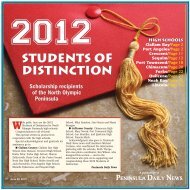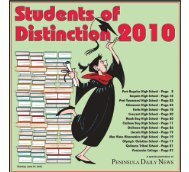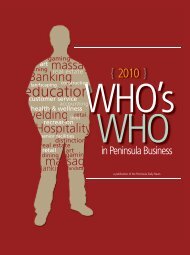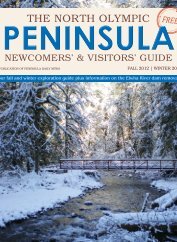Create successful ePaper yourself
Turn your PDF publications into a flip-book with our unique Google optimized e-Paper software.
The Clark family has a long history<br />
on the <strong>Peninsula</strong>. Since 1853, the family<br />
engaged in all manner of farming and<br />
money-making ventures — from racehorses<br />
to tulips and turkeys to timber —<br />
on land north of Sequim.<br />
Tom’s passion for farming began during<br />
childhood while helping his Uncle<br />
Elliott Clark, who owns his own farm in<br />
Joyce where he raises beef cattle and<br />
timber. Tom earned a Bachelor of Science<br />
degree in animal science-meats management<br />
from Washington State University<br />
in 1988 and spent a year in Australia,<br />
working on a 100-percent grass fed dairy<br />
farm. That internship in Australia 20<br />
years prior helped lay the groundwork<br />
for the Clarks’ new farming operation.<br />
“We had a mission and a goal but not<br />
really a solid plan for our business,”<br />
Holly says.<br />
A family friend told the couple about<br />
a 2009 EcoAgricultural Conference in St.<br />
Louis — the Clarks attended and were<br />
totally inspired.<br />
They listened to speakers and found<br />
an abundance of resources to help them<br />
on their journey. They learned there<br />
were a multitude of formulas that could<br />
preserve Clark Farm’s pristine beauty,<br />
make their family healthier and have<br />
the potential to make money, too.<br />
Holly and Tom returned from St.<br />
<strong>Living</strong> healthy<br />
means I will...<br />
• Keep moving<br />
• Remain independent<br />
• Invest in my physical health<br />
How can we help you?<br />
www.therapeuticassociates.com<br />
Louis, put their Port Angeles home on<br />
the market and worked out a land lease<br />
with Tom’s parents. They set out to<br />
raise 100 percent grass-fed beef free of<br />
antibiotics, hormones and steroids.<br />
Their animal husbandry was and still<br />
is centered on preventive care and a<br />
stress-free environment where cattle are<br />
grazing herbivores. Animals move over a<br />
mile a day to keep them healthy, happy<br />
and their hooves in shape.<br />
Along with taking great care in the<br />
diet and exercise of their animals, the<br />
Clarks also make caring for the soil and<br />
ecosystem a top priority.<br />
They don’t use chemical fertilizers,<br />
pesticides or herbicides, and the pastures<br />
are diverse in plant species to ensure<br />
animal and soil health.<br />
Pigs help keep menacing plants in<br />
check. Currently Clark Farm’s pigs are<br />
working in fields that have too much<br />
thistle and wild barley — the pigs eat it<br />
down, aerate the soil and replenish the<br />
soil with a more diverse fecal flora.<br />
Tom and Holly also raise their own<br />
hay and sell it to locals.<br />
Their large, 113-acre parcel is home<br />
to no more than 72 cows at a time — a<br />
small number of animals by most farming<br />
standards.<br />
Because the animals get lots of exercise,<br />
the result for consumers is a much<br />
YOUR PARTNER IN HEALTH<br />
PORT ANGELES<br />
1114 Georgiana St.<br />
360-452-6216<br />
portangeles@taiweb.com<br />
facebook.com/PortAngeles<br />
SEQUIM<br />
1400 W Washington St,<br />
Ste 102<br />
360-683-3710<br />
sequim@taiweb.com<br />
23587107<br />
leaner animal.<br />
When it comes time to slaughter a cow,<br />
Tom will move the rest of the herd into<br />
the woods to prevent the stress they feel.<br />
“They [the cows] are our livelihood,”<br />
Holly says.<br />
“And we respect them immensely.”<br />
The Clarks lost $116 on the first animal<br />
they harvested. Part of the problem,<br />
Holly says, was that they didn’t realize<br />
just how high-quality their meat was.<br />
“We knew raising animals on pasture<br />
was a good thing we just didn’t know<br />
how good until we read the research,”<br />
Holly says.<br />
Grass-fed beef isn’t easy to come by,<br />
and on the North Olympic <strong>Peninsula</strong>.<br />
Tom and Holly were the first 100 percent<br />
grass-fed beef growers to sell by the cut<br />
in Clallam County.<br />
After adjusting prices to reflect the<br />
meat’s quality, and after a steep learning<br />
curve, the farm is on its way to fiscal<br />
health, the couple says.<br />
The Clarks have found there is indeed<br />
a market for top-quality, sustainably<br />
raised meats in Port Angeles and the<br />
surrounding areas.<br />
“People are educated,” Holly says.<br />
“And they are tired of the food system.”<br />
Twenty years ago, the couple readily<br />
admits that their farming venture would<br />
have failed.<br />
But documentaries like Food Inc.,<br />
locavore movements and big increases in<br />
food-related diseases and childhood obesity<br />
have all contributed to a growing<br />
awareness that it matters what people<br />
put into their bodies. And it matters<br />
maybe more than anything else.<br />
“Currently we are in a food system<br />
where food travels on average 1,500<br />
miles to end up in the grocery store were<br />
consumers can buy it,” Holly says.<br />
She says that the number one foods<br />
subsidized by the government are corn,<br />
wheat, soybeans and dairy — foods that<br />
in excess are linked with obesity and<br />
heart disease.<br />
“We are seeing the health of America<br />
deteriorate from diseases caused by poor<br />
nutrition,” Holly says.<br />
“But, people are becoming more<br />
aware of the problems we and our food<br />
system have created,” Holly says.<br />
She says that locally, there is a growing<br />
niche for locally distributed food of<br />
high quality that supports small farmers<br />
like them who are working toward a sustainable<br />
community, clean environment<br />
and clean food.<br />
Slower pace<br />
Farming is a whole new way of life for<br />
the Clark family.<br />
“We now concentrate on what is<br />
important to us now — better health,<br />
our children, friends and our community,”<br />
Holly says.<br />
Ninety percent of the family’s meals<br />
come from raw foods traded or grown<br />
themselves.<br />
Though she acknowledges that they<br />
still have a long way to go, Holly says she<br />
has personally lost more than 30 pounds.<br />
Her main goal was to have more energy<br />
and prevent inflammation flare ups. She<br />
has accomplished both and has not been<br />
on any medication in three years.<br />
Jack, 18, went from being a 230<br />
pound high school sophomore to a lean,<br />
170-pound college freshman at the Washington<br />
State University.<br />
Maddie, 14, loves her role on the farm.<br />
She can be found at the Port Angeles<br />
Farmers Market helping her parents sell<br />
the family farm’s meat.<br />
Tom gets to do what he absolutely<br />
loves to do — farm and raise animals.<br />
Holly calls him the “cow whisperer.”<br />
Thankfully, Holly and Tom feel they<br />
weren’t too late to instill what they feel is<br />
a better value system in their children.<br />
“Material things come and go but<br />
health and happiness are something you<br />
need to work at every day for a long<br />
quality life,” she says.<br />
“I see my kids valuing this, too, and it<br />
makes me feel like we made the right<br />
choice to do what we are doing.”<br />
One of the great joys for Tom and<br />
Holly are hearing stories from their customers<br />
who have met health challenges<br />
with nutritional healing — Clark Farms’<br />
meat being part of their healing diets.<br />
After 21 years of teaching in Clallam<br />
County, Holly says she knows it takes a<br />
community to raise kids, and now as a<br />
farmer she see it takes a community to<br />
raise food as well.<br />
“Local is where it’s at for the health of<br />
us as individuals, the community and<br />
the U.S. economy,” she says.<br />
She and Tom feel blessed to be a part<br />
of that local movement.<br />
— STORY AND PHOTO<br />
BY JENNIFER VENEKLASEN<br />
where to find |<br />
CLARK FARMS’ BEEF<br />
In Port Angeles, buy Clark Farms beef at<br />
Good To Go Grocery and Saturdays at the<br />
Port Angeles Farmers Market.<br />
In Sequim, find them at Hardy’s, The<br />
Red Rooster Grocery and Nash’s Farm<br />
Store. Meats are also available at Agnew<br />
Grocery, Sunset West Co-op in Clallam Bay<br />
and at the Joyce General Store.<br />
If you’re eating out, try Alder Wood<br />
Bistro in Sequim, Old Mill Cafe or Gabby’s<br />
Gourmet in Carlsborg, Kokopelli Grill or<br />
Bella Italia in Port Angeles.<br />
Climate, soils, healthy grasses and<br />
tender care create a bold flavor.<br />
PENINSULADAILYNEWS.COM | HEALTHY LIVING | MARCH 2012 9












